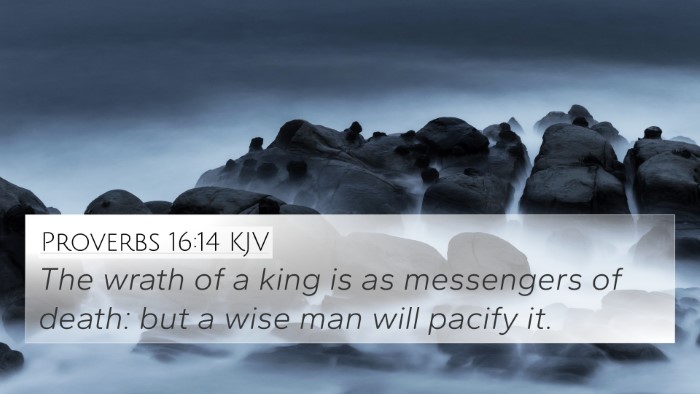Understanding Ecclesiastes 8:3
Ecclesiastes 8:3 states: "Be not hasty to go out of his sight: stand not in an evil thing; for he doeth whatsoever pleaseth him." This verse reflects the complexity of human interactions with authority and the attempts to balance respect with personal integrity.
Contextual Analysis
This passage occurs in the context of wisdom literature, where the author seeks to express deeper truths about life, morality, and the role of authority. Solomon, traditionally viewed as the author of Ecclesiastes, moves through various reflections on life’s meaning, justice, and the recurring themes of vanity and the inevitability of death.
Key Themes
- Respect for Authority: The call to not act hastily in the presence of a king signifies an underlying respect for those in power.
- Moral Integrity: The warning against standing in an “evil thing” suggests a need for personal integrity despite external pressures.
- Divine Sovereignty: The acknowledgment that “he doeth whatsoever pleaseth him” highlights the belief in God’s ultimate control over human affairs.
Public Domain Commentary Insights
Matthew Henry’s Commentary expresses that this verse serves as a caution against rashness and arrogance when addressing authority. He urges readers to recognize the importance of composure and humility in navigating complex societal structures.
Albert Barnes elaborates that the verse implies wisdom and understanding should prevail over impulsive actions, reminding us to remain vigilant and moral, even under pressure.
Adam Clarke discusses how this verse relates to the broader narrative of wisdom in dealing with the uncertainties of life, urging individuals to seek knowledge and discernment especially in communication with those in power.
Bible Verse Cross-References
Ecclesiastes 8:3 can be related to several other scriptures that explore themes of authority, morality, and divine power:
- Proverbs 14:35: "The king's favor is toward a wise servant: but his wrath is against him that causeth shame."
- Romans 13:1: "Let every soul be subject unto the higher powers. For there is no power but of God: the powers that be are ordained of God."
- Matthew 10:28: "And fear not them which kill the body, but are not able to kill the soul: but rather fear him which is able to destroy both soul and body in hell."
- Psalms 37:5: "Commit thy way unto the LORD; trust also in him; and he shall bring it to pass."
- James 4:10: "Humble yourselves in the sight of the Lord, and he shall lift you up."
- 1 Peter 2:17: "Honor all men. Love the brotherhood. Fear God. Honor the king."
- Ephesians 6:5-6: "Servants, be obedient to them that are your masters according to the flesh, with fear and trembling, in singleness of your heart, as unto Christ."
Connecting the Dots: Inter-Biblical Dialogue
This verse creates a dialogue with both the Old and New Testament that emphasizes the importance of righteous living in response to authority. Through cross-referencing these texts, one can see the consistent biblical theme of balancing authority with moral integrity:
- Identifying connections between Old and New Testament: This is particularly evident when comparing the teachings of Jesus on authority to the wisdom found in Ecclesiastes.
- Bible cross-references for sermon preparation: Ecclesiastes 8:3 serves as an excellent foundation for discussing the intersection of wisdom and obedience within communities of faith.
- Cross-referenced themes: The repeated encouragement to fear God as the ultimate authority appears throughout both testaments, reinforcing the necessity of humility.
Thematic Bible Verse Connections
Several themes emerge when connecting this verse with others in the Bible:
- Wisdom and Understanding: Cross-referencing Proverbs 4:7 emphasizes that wisdom is the principal thing, urging believers to prioritize gaining insight.
- Authority and Submission: Links between Romans 13 and Ecclesiastes 8:3 deepen our understanding of our relational stance toward governing powers.
- Integrity in Actions: The parallels between this verse and Colossians 3:22 remind followers to serve sincerely, not only when being watched.
Practical Reflection
This verse challenges believers to consider how they navigate authority and morality in daily life:
- How to use Bible cross-references: By actively seeking connections within scripture, one can cultivate a more rounded understanding of biblical teachings.
- Tools for Bible cross-referencing: Utilize a Bible concordance or cross-reference guide to enhance your study experience.
- Bible chain references: Following thematic chains through scripture can unveil deeper insights into personal faith journeys.
Conclusion
Ecclesiastes 8:3 serves as a poignant reminder of the complexity of human relationships with authority, calling for a balance of respect, integrity, and acknowledgment of divine sovereignty. By engaging with related scriptures through cross-referencing, readers can deepen their understanding of these themes and grow in their faith.













